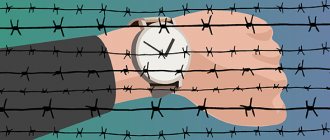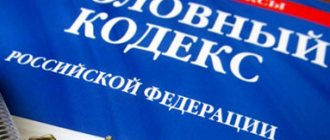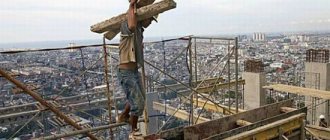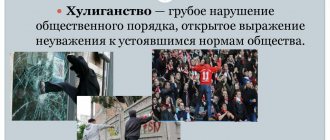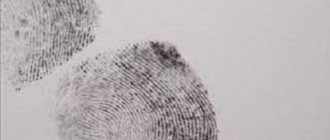Criminal Code of the Russian Federation in the latest edition:
Article 26 of the Criminal Code of the Russian Federation. Crime committed through negligence
1. A crime committed through negligence is an act committed through frivolity or negligence.
2. A crime is recognized as committed due to frivolity if a person foresaw the possibility of socially dangerous consequences of his actions (inaction), but without sufficient grounds, he arrogantly hoped to prevent these consequences.
3. A crime is recognized as committed through negligence if a person did not foresee the possibility of socially dangerous consequences of his actions (inaction), although with the necessary care and forethought he should and could have foreseen these consequences.
Return to the table of contents of the document: Criminal Code of the Russian Federation in the latest edition
Comments on Article 26 of the Criminal Code of the Russian Federation
The Criminal Code of the Russian Federation does not disclose the normative concept of negligence, establishing only its forms.
Carelessness is a form of mental attitude of the subject to the committed act and its consequences, in which there is no volitional desire of the person to cause socially dangerous consequences.
Article 26 of the Criminal Code of the Russian Federation provides for two forms of reckless crimes:
- 1) a crime committed due to frivolity;
- 2) a crime committed due to negligence.
Additional features and nuances
The punishment for a careless crime depends on the severity of the consequences. The culprit can get off with a fine of several tens of thousands of rubles, be forced to attend correctional or forced labor, and lose his freedom. The most severe punishment is imprisonment, with a maximum term of 2-3 years , while for intentional murder the offender serves a prison sentence for 20 years, if not life.
The criminal must prove that he behaved carelessly and did not want the tragic consequences that had already occurred. Practice shows that sometimes a person manages to completely avoid responsibility - if the court is convinced that the incident is not his fault. This usually happens in the medical field - it is difficult to prove a doctor’s guilt and hold him accountable.
frivolity
In case of frivolity, a person foresees the possibility of socially dangerous consequences of his action (inaction), but without sufficient grounds for this, he arrogantly hopes to prevent such consequences.
The intellectual element of frivolity consists in a person's anticipation and understanding of the possibility of dangerous consequences of his actions (inaction).
The volitional element of frivolity lies in the reluctance of their occurrence and in the arrogant, groundless expectation of preventing them. A person hopes for non-occurrence or avoidance of consequences, but incorrectly assesses the actual circumstances of his actions (inaction) (the situation, the impact of external factors, his own experience, the actions of other persons, etc.). The calculation turns out to be incorrect, and socially dangerous consequences occur.
The presence of foresight of the possibility of socially dangerous consequences brings frivolity closer to indirect intent. However, unlike the latter, when a person agrees with the onset of socially dangerous consequences, when he is frivolous, he has a negative attitude towards them. It does not allow them, believing that the consequences will not occur.
Guilt in the case of frivolity lies, strictly speaking, in the fact that a person does not thoroughly weigh the significance of the circumstances in which he commits an act, overestimates or, conversely, underestimates them. For example, the driver of a vehicle, exceeding the established speed, considers the violation to be formal, since he believes that he is driving in a deserted place. Without sufficient grounds to conclude that it is impossible for people to appear on the roadway in a deserted place, he relies on his driving experience, overestimating it.
A frivolous calculation to prevent consequences consists of a combination of two elements:
- 1) the person intends to prevent them;
- 2) the person incorrectly assesses the actual circumstances of his actions.
Article 26.4. Expertise
Determination of the Constitutional Court of the Russian Federation dated October 24, 2019 N 2918-O Article 26.4 of the Code of Administrative Offenses of the Russian Federation defines the legal basis for the appointment and conduct of an examination in a case of an administrative offense and does not contain rules allowing the judge, body, or official who made the decision to appoint an examination to return this definition without execution. Thus, the contested legal provisions cannot be considered as violating the constitutional rights of the applicant in the aspects indicated by him.
Determination of the Constitutional Court of the Russian Federation dated November 28, 2019 N 2979-O
The applicants also believe that parts 1 and 3 of Article 1.4, parts 1, 3 and 4 of Article 1.5, part 1 of Article 1.6, parts 1 and 2 of Article 2.1, part 2 of Article 14.1, part 3 of Article 14.17, Article 25.5, Article 26.2, part 1 of Article 26.4, parts 1, 2 and 6 of Article 27.8, part 8 of Article 27.10, parts 3 and 3.1 of Article 28.7 of the Code of Administrative Offenses of the Russian Federation and the contested provisions of the Labor Code of the Russian Federation do not correspond to Articles 6 (Part 2), 8 (Part 1), 15 , 19 (part 1), 34 (part 1), 35 (parts 1 and 2), 45 (part 1), 46 (part 1), 49 (parts 2 and 3), 50 (part 2) and 51 of the Russian Constitution Federations because they allow:
Ruling of the Supreme Court of the Russian Federation dated February 15, 2017 N 305-AD16-15631 in case N A40-222534/2015
The applicant’s disagreement with the conclusions contained in the laboratory research reports and expert reports is not grounds for canceling the judicial acts adopted in the case, since it does not follow from the applicant’s arguments that the society, when considering the case in accordance with the provisions of Part 1 of Article 25.1, Article 26.4 of the Code of the Russian Federation on administrative offenses provided evidence of the incorrectness of the research findings. There is also no evidence that society raised the question of the need to commission a forensic examination.
Determination of the Constitutional Court of the Russian Federation dated November 23, 2017 N 2527-O
2.1. In accordance with the provisions of Articles 96 and 97 of the Federal Constitutional Law “On the Constitutional Court of the Russian Federation,” a citizen has the right to appeal to the Constitutional Court of the Russian Federation with a complaint about the violation of his constitutional rights by the law applied in a specific case, the consideration of which has been completed in court. Meanwhile, the applicant has not submitted documents confirming the application of Part 6 of Article 26.4 and Part 4 of Article 29.3 of the Code of Administrative Offenses of the Russian Federation when resolving his specific cases in court. Accordingly, the applicant’s complaint in this part does not meet the criterion of admissibility of appeals to the Constitutional Court of the Russian Federation.
Ruling of the Supreme Court of the Russian Federation dated March 12, 2019 N 306-ES19-650 in case N A55-14115/2017
Having established that in the period from April to August 2014, on the basis of rulings on the appointment of an examination to establish the severity of the harm caused to the victims, in cases of administrative offenses initiated in connection with violation of traffic rules, issued by traffic police officers of various structural divisions of the Samara region , the plaintiff carried out examinations, drew up expert reports, which were handed over to traffic police officers, but not paid for, the issue of the costs of conducting examinations when making procedural decisions in administrative cases is not resolved, the production of forensic medical examinations in cases of administrative offenses is not included in the scope state (“official”) assignment, the institution is deprived of the opportunity to refuse to conduct examinations, guided by the provisions of Articles 24.7, 26.4 of the Code of the Russian Federation on Administrative Offenses, paragraph 22 of the Decree of the Government of the Russian Federation of December 1, 2012 N 1240 “On the procedure and amount of compensation for procedural costs, related to criminal proceedings, costs in connection with the consideration of a civil case, an administrative case, as well as costs in connection with the implementation of the requirements of the Constitutional Court of the Russian Federation and the recognition as invalid of certain acts of the Council of Ministers of the RSFSR and the Government of the Russian Federation,” paragraph 26 of the Plenum resolution of the Supreme Court of the Russian Federation dated March 24, 2005 N “On some issues that arise for the courts when applying the Code of the Russian Federation on Administrative Offences”, the courts came to the conclusion that the expenses incurred are subject to reimbursement by the Main Directorate of the Ministry of Internal Affairs of Russia for the Samara Region from the federal budget allocated for conducting examinations in cases of administrative offenses.
Determination of the Judicial Collegium for Economic Disputes of the Supreme Court of the Russian Federation dated May 25, 2020 N 305-ES19-23348 in case N A40-112566/2019
The authority of the body or official in charge of the case of an administrative offense to order an examination in the event of a need to use special knowledge in science, technology, art or craft is provided for in Part 1 of Article 26.4 of the Code of Administrative Offenses of the Russian Federation. The determination on the appointment of an examination made by the named persons is mandatory for execution by experts or institutions entrusted with carrying out the examination.
Determination of the Judicial Collegium for Economic Disputes of the Supreme Court of the Russian Federation dated May 25, 2020 N 305-ES19-23482 in case N A40-61853/2019
The authority of the body or official in charge of the case of an administrative offense to order an examination in the event of a need to use special knowledge in science, technology, art or craft is provided for in Part 1 of Article 26.4 of the Code of Administrative Offenses of the Russian Federation. The determination on the appointment of an examination made by the named persons is mandatory for execution by experts or institutions entrusted with carrying out the examination.
Ruling of the Supreme Court of the Russian Federation dated June 18, 2020 N 305-ES20-8136 in case N A40-123319/2019
Having assessed the evidence presented in its totality and mutual connection, guided by the provisions of Articles 15, 190, 196, 199, 200, 1071 of the Civil Code of the Russian Federation, Articles 24.7, 26.4, 25.14 of the Code of the Russian Federation on Administrative Offences, Article 158 of the Budget Code of the Russian Federation, resolution Government of the Russian Federation dated 04.03.2003 N 140 “On the procedure and amount of reimbursement of expenses of some participants in proceedings in cases of administrative violations and remuneration for their labor”, taking into account the legal position expressed in paragraph 20 of the Review of Judicial Practice of the Supreme Court of the Russian Federation N 3 (2016) , approved by the Presidium of the Supreme Court of the Russian Federation on October 19, 2016, the courts of first and appellate instances came to the conclusion that there were conditions for imposing on the ministry the obligation to compensate for losses caused to the organization, with which the district court agreed.
Resolution of the Supreme Court of the Russian Federation dated July 5, 2017 N 46-AD17-9
Part 1 of Article 26.4 of the Code of Administrative Offenses of the Russian Federation establishes that in cases where, during the proceedings on a case of an administrative offense, there is a need to use special knowledge in science, technology, art or craft, the official in charge of the case makes a determination on the appointment of an examination.
Resolution of the Supreme Court of the Russian Federation dated October 30, 2017 N 77-AD17-8
In accordance with Part 1 of Article 26.4 of the Code of the Russian Federation on Administrative Offences, in cases where in the proceedings on a case of an administrative offense there is a need to use special knowledge in science, technology, art or craft, the judge, body, official in whose proceedings the case, make a ruling on the appointment of an examination.
Resolution of the Supreme Court of the Russian Federation dated January 20, 2017 N 57-AD16-16
Contrary to the applicant’s assertion, there were no violations of the procedure for appointing and conducting a commodity customs examination provided for in Article 26.4 of the Code of the Russian Federation on Administrative Offences, which could lead to the recognition of the expert’s conclusion as inadmissible evidence in the case. The conclusion of the commodity customs examination is objective, the expert’s conclusions are reasoned and justified. The cost of the goods submitted for examination is determined taking into account its actual condition, configuration, degree of physical and functional wear and tear, using the necessary price and technical information. There is no reason to doubt the expert's competence. The courts came to the correct conclusion about the admissibility of this evidence.
